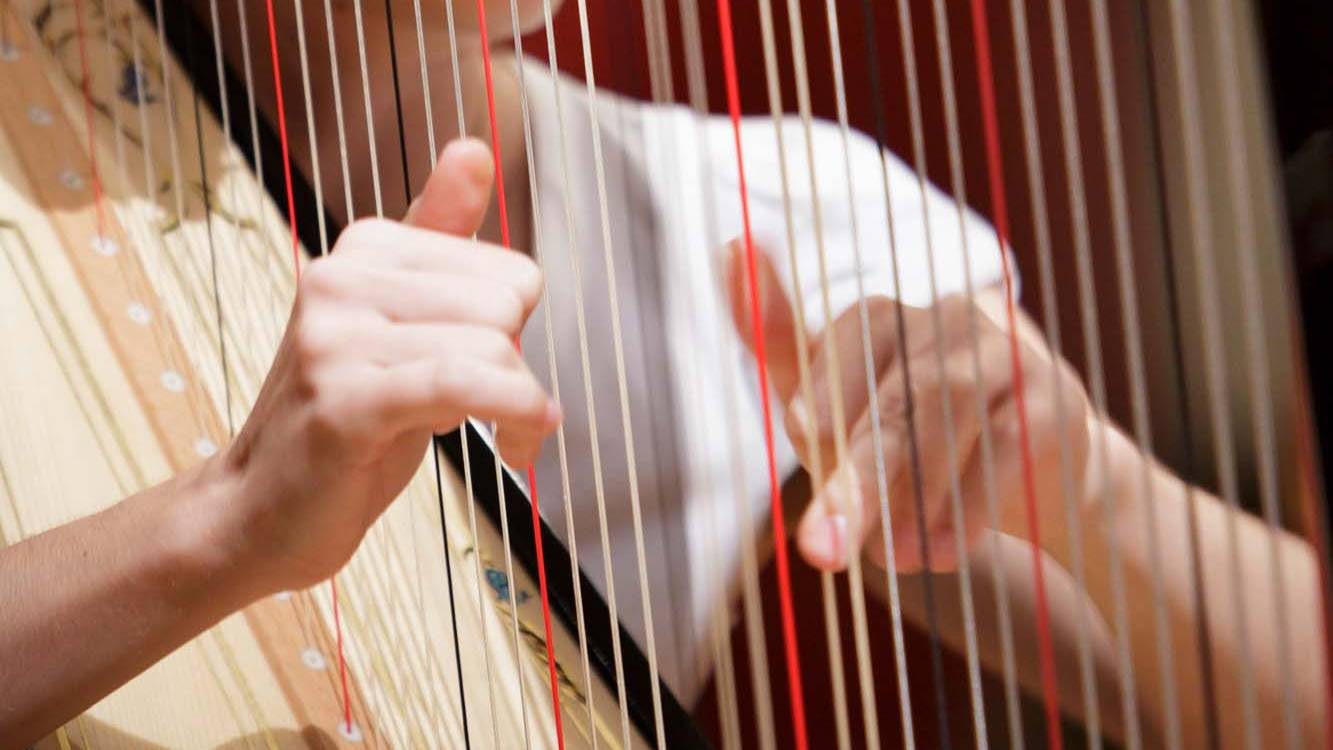
BMus (Hons) Music Composition / Performance / Jazz
Course details
Introduction
The music industry is an ever-evolving landscape. How will you shape it? Our four-year undergraduate degrees in Composition, Performance and Jazz are designed to give you the tools you need to define your artistic voice and use it to lead the arts beyond convention.
Key Features
Your training will be centred around practical learning with a curriculum designed to develop your curiosity, professional skill set, and understanding of the contemporary world and music’s place within it.
During your time at Trinity Laban, you will advance your technique and musicianship through individual and group tuition, and many diverse performance opportunities. Alongside recitals and building your experience in small and large ensemble contexts, you will have the opportunity to collaborate in multi-artform projects and present your work to a range of audiences.
You will be immersed in an inspirational community of global arts creators, from fellow students and staff, to visiting artists, ensemble directors and lecturers, creating the space for you to explore and challenge your artistry, and grow your professional network.
The demands of the profession are diverse, which is why your training here goes beyond traditional music education. You will develop entrepreneurial and business skills, learn how to look after your health and well-being as a musician, and establish robust learning techniques which will see you through your career.
Key Facts
- UCAS, Composition / Performance
- 300F
- UCAS, Jazz
- 310F
- Location
- King Charles Court
- Duration
- 4 years (full time)
- Start Date
- September
Fees
Audition fees
Please note that there is an audition fee for this course of £95 (for 2025 entry). You will also need to pay the UCAS Conservatoires administration fee of £28.50 for the 2025 entry cycle.
Downloads
Key Dates
-
Applications open on UCAS
-
On time deadline
-
Welcome Week
-
Autumn Term
-
Spring Term
-
Summer Term
Detailed Information
| Year of Study | Credits | Weighting |
| Year 1 | 120 | Pass/Fail |
| Year 2 | 120 | 10% |
| Year 3 | 120 | 30% |
| Year 4 | 120 | 60% |
Modules
Professional Studies
This core module runs throughout your four years. One-to-one tuition is central and your Principal Study can be flexible depending on your needs and department’s syllabus.
Alongside your individual lessons, you will receive group tuition in an array of classes covering knowledge and skills to prepare you for your professional life. There will be a mix of department-specific classes, such as teaching skills, and cross-departmental classes, including informed performance practice, musicians’ health and well-being, movement for musicians, and technology for learning.
Ensemble performance also forms part of this module; from choirs to operas, quartets to orchestras, or jazz trios to big bands, you will get hands on experience in a wide variety of groups.
Follow the link to find out more about ensemble performance opportunities.
Academic Studies
In this module you will develop your critical and analytical abilities, and further your knowledge, enabling you to bring an informed approach to your artistic practice.
On the classical pathway, you will explore music history and context relating to Western classical music traditions, form and analysis, presentation and research skills, aural training, harmony, improvisation, and arrangement.
If you are on the jazz pathway, you will study music history and context relating to jazz traditions, jazz harmony, composition, arrangement, and rhythmic origins from other related traditions.
The artists as…
Each year, you will take part in classes that relate to the broader professional landscape. ‘The Artist as…’ module is an opportunity for you to explore and orientate your professional aspirations, developing your leadership, entrepreneurialism and business skills.
As part of this module, you will dive into teaching and community career opportunities and investigate how repertoire can be presented to audiences creatively.
Your final year is your chance to bring together all your learning and apply it to your own individual project. These often taking place in external settings and are a springboard into your professional career.
CoLab
Each spring, you will take part in CoLab; a two-week festival where you will come together with students and staff from across the conservatoire, and visiting artists from around the world, to create works rooted in imagination and experimentation.
Here you can take risks in a creative environment which prioritises process, enabling you to push the boundaries of your artform.
You can propose projects or get involved with those put forward by students and/or staff. There is an extensive and eclectic range of projects to be a part of, including interdisciplinary work with dance, art and theatre, an array of musical styles, and the opportunity to work with our partner organisations.
Electives
You can select one elective in year 3 and 4 respectively.
Please note, the following is an indicative list; not all electives will necessarily run every year.
Year 3
- Analysis for Performance – Communicating Form
- Arranging for Small Ensembles
- Collaborative Composition for Performers
- Conducting
- Critical Popular Music
- Digital Musicianship for Performers
- Essential Performing Practice
- Improvisation and Interpretation
- Instrumental and Vocal Teaching
- Introduction to Music Psychology
- Neglected Repertoires: Taste, Formation and the Canon
- Opera and Theatre
Year 4
- Advanced Instrumental and Vocal Teaching
- Advanced Conducting
- Advanced Orchestration
- Arranging for Large Ensembles
- Capstone Project
- Colab Creative Project
- Composing for Media
- Creative Leadership
- Fourth Plinth
- Music and Dance
- Music, Gender and Sexuality
- Cultural Perspectives on Music (Musicology)
- Opera and Musical Theatre
- Jazz Perspective on Counterpoint and Harmony
If you take both Instrumental and Vocal Teaching electives, you are eligible to take the externally offered L.T.C.L. (offered by Trinity College London) at no cost.
Entry Requirements
- Grade 8 standard in Principal Study
- 3 GCSEs (including English Language) at Grade C or above
- Two A level passes (of which one should normally be Music) or equivalent qualifications and/or relevant prior experience may be considered
Entry to the programme is dependent upon selection at audition. The audition comprises a performance / composition audition.
If you are interested in the Performer/Composer pathway, please note that this is available for year 3 and there are no specific audition requirements for this.
English language requirements
-
IELTS (General or Academic Training) minimum 5.5 in all four areas; or B2 First (Cambridge English) minimum 160 in all four areas; or Trinity College London – Integrated Skills in English level II or above.
-
If you require a student visa to study in the UK, you may require a Secure English Language Test (SELT). More information can be found at gov.uk.






















